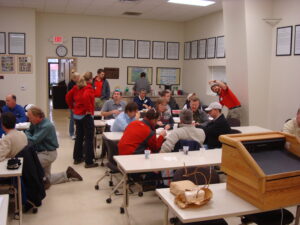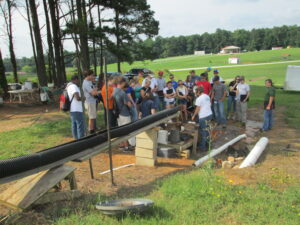Erosion, Sediment, and Turbidity Control on Construction Sites
Erosion, Sediment, and Turbidity Control
on Construction Sites
| Registration is open |
| Contact: Jazmin Garcia-Lawson 919-513-3224 Jamie Luther 919-513-3321 soils_training@ncsu.edu |
May 14, 2024
Raleigh, NC
|
|
Summary There is increasing pressure on construction site managers to reduce the off-site impacts of stormwater runoff on streams, lakes, and estuaries adjacent to their projects. Traditional erosion and sediment control measures, even when properly installed and maintained, will often release highly turbid water to the environment. Increasing scrutiny and regulation of these discharges is driving developers to seek cost-effective practices to address the turbidity that standard sediment traps and basins cannot capture. With over two decades of research including construction site testing, we’ve found that turbidity can be reduced to often two orders of magnitude lower using chemical treatments. This workshop will provide participants with the background and knowledge to implement a wide range of methods to reduce turbidity in construction site stormwater, in addition to traditional erosion and sediment controls. The workshop is designed to provide practical information on the use of chemical treatments to improve water quality for professionals involved in designing and managing erosion, sediment, and turbidity control on construction sites. Test Your Sediment Samples Bring one or more samples of sediment from your own construction sites. You will have an opportunity to practice the screening process to match the best polymer to your sediment. Bring about 200 grams or a 1/2 cup in a small container. Please do not bring samples from outside North Carolina. |
You Will Learn About:

- Background in theory and chemistry, environmental and regulatory concerns.
- Optimal erosion control methods
- A variety of methods to reduce sediment losses with little additional cost.
- Key factors in making polyacrylamide work in passive dosing systems.
- Methods available for treating pumped water.
- The relative risks of using chemical treatments for turbidity reduction.
- How to estimate the costs and materials needed for projects.
- Screening methods using your own soil (or those we have on hand).
|
Please wear appropriate clothing for field demonstrations. Who Should Attend:
Professional Education Credit:
|
Registration Information May 14, 2024 Participant: $225 The registration fee includes refreshments, lunch, and a certificate of attendance. Workshop Address: Nearby Hotels: TownePlace Suites by Marriott |
|||||||||||||||||||||||||||
|
Agenda
|
||||||||||||||||||||||||||||
